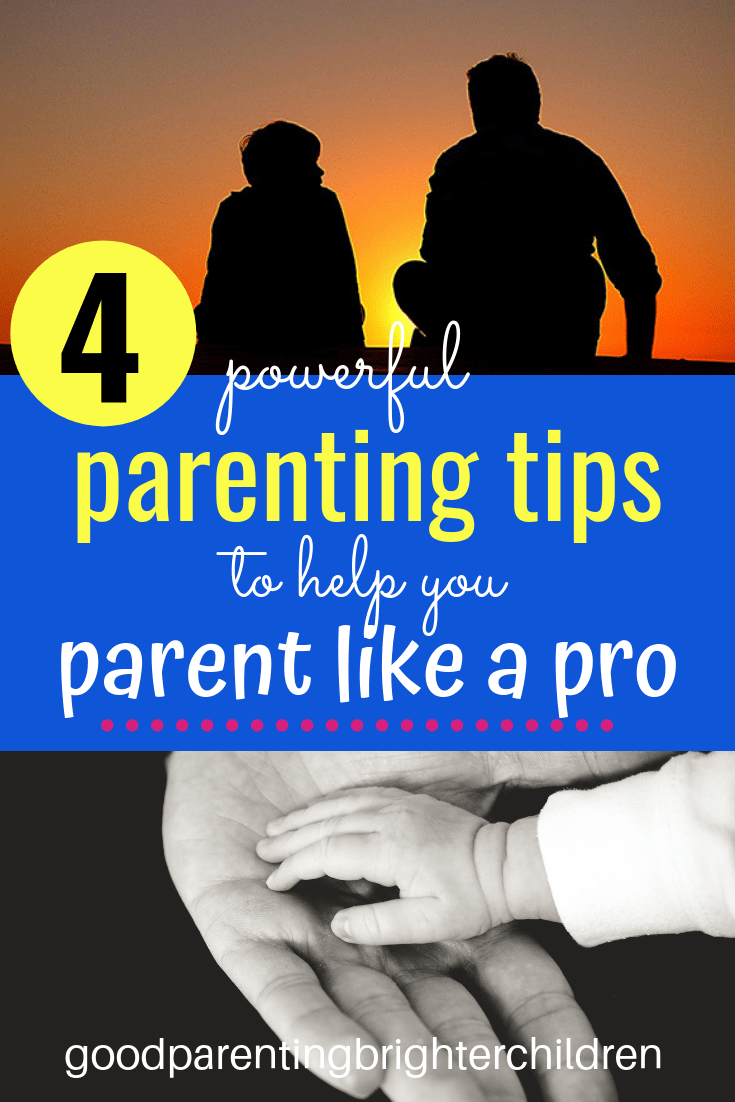Inside: Parenting is the most important work you will ever do. And every parent can learn to “Parent like a Pro.” Here are four parenting tips to help you on this exciting journey called, “parenting.”
Like most mothers, I will never forget the first time I held each of my sons in my arms. It was love at first sight. I had never seen anything so wonderful and beautiful as my little newborn. Feelings of love and incredible joy overcame me. Everything felt perfect. Everything felt precious.

Do you remember the feelings you had when you held your newborn infant for the first time? It’s the most amazing experience in the world!
Then reality set in.
I don’t mean to be pessimistic, but the day you become a parent, you sentence yourself to a lifetime of hard labor. (Hard to believe—that little newborn is so amazing!).
Parenting is tough. In fact, it may be the most difficult work you will ever do. But don’t dismay, you can learn how to parent like a pro. Despite the challenges, parenthood comes with amazing perks. The experience is positively unforgettable. There’s nothing quite like it. And yes, I highly recommend it.
Comedian and actor Steve Martin in a 2007 interview with Charlie Rose said that his strategy for learning the banjo was “sticking with it.” And by sticking with it, eventually, 40 years of practicing and learning the banjo would pass. And by sticking with anything for 40 years, you’ll end up being pretty good at it.
I’ve been parenting for 40 years. So, according to Steve Martin, I should be pretty good at it. I don’t know about that, but there’s one thing I do know: what I’ve gleaned from being a parent has enriched my life exponentially.
They say, “History repeats itself” which means we don’t usually learn from the past, or from other people’s experiences. Maybe that’s what life is all about—getting off the sidelines, jumping headlong into the water, and experiencing the world on our own terms.
So, while you’re treading water, here are a few things I’ve learned from being a parent for 40 years. Think of this as a buoy I’m tossing you to help you swim through these (sometimes) shark-infested waters.
Four Parenting Tips to Help You Parent Like a Pro
Parenting Tips #1: Parenting is a Profession.
Years ago I went to an event and a woman at the dinner table asked what I did for a living. I blurted out the first thing that came to my mind, “I’m a professional mother,” (knowing she had a Ph.D. in Astrophysics and I was just a stay-at-home mom).
“Wow,” I thought to myself, “that description works!” I liked the sound of it. What I was doing as a mom was important.
From that point on—that is what I called myself…a professional mom.
Parenting is not a hobby and it’s not just a job. It’s a profession. So, don’t think of yourself as just a “mom” or “dad.”
We go to college to gain information. We get a job to apply what we learned in college. Eventually, we can become a professional in a chosen field. We think of a professional person as someone with education, knowledge, skill, and expertise in some area.
If you are working hard to be the best parent ever by reading books, articles, and blogs on parenting; getting advice from seasoned parents, and applying what you learn, then you are on the fast track to becoming a Professional Parent (P.P.) (a couple of great books on this subject: How Children Succeed by Paul Tough, and Lighting Their Fires by Rafe Esquith)
Just because you don’t have university letters attached to the end of your name don’t worry. It doesn’t matter.
Successful parenting takes more hands-on knowledge, skill and expertise than you will ever glean in the Ivory Tower. And it requires more blood, sweat, and tears than what you will experience at a conventional job. It all comes from learning how to parent like a pro.

Successful parenting requires that you seek out knowledge from books, articles, blogs and experienced parents about what it takes to be a great parent.
If you don’t believe me—here’s my “job description of a parent” (and this doesn’t even begin to cover it all).
My Partial Job Description of a Parent:
- Your “co-workers are your top priority. You must be available to help and assist them 24/7 including holidays and weekends which require extra work.
- Your co-workers will be demanding and immature and may have regular temper-tantrums and melt-downs (depending on their age). Despite their demands, you must be patient.
- Teaching and training your co-workers about their role in the company (family) and in life is a must. Because eventually they will go out and start their own “companies.” You want them to be a success.
- You must balance your instructions with toughness and high expectations as you tutor and encourage your co-workers through the hills and valleys of life.
- Given their inexperience, do not expect words of appreciation or gratitude. It’s not in their vocabulary.
Bottom line: if you are applying for parenthood, you need to channel your inner Houdini.
Remember: Because parenting is tough, it’s important to view yourself as a professional. It will give you the added confidence and understanding that what you are doing within the walls of your home is the most important work you will ever do.
Think of yourself as a professional parent. Because you are.
Parenting Tips #2: Listen to “Old” People
I thought when you became a mother you were instantly endowed with “natural motherly instincts.” So, I wasn’t keen on listening to older mothers.
Stupid, (I now know).
How many times are we told to “listen to your elders?” And how many times do we look at old people and feel they are out of touch and are the last people we’re going to listen to or seek advice from?

Take the time to listen to “old” people. Because of their vast experience, they are perfect people to get advice from regarding child rearing.
Well, it took me until I was “old” to realize the folly of my ways.
At age 50, I had an epiphany. I realized the majority of people I had listened to over the years about raising kids were my peers who had the same experience I had (little to none).
I found that old people had been in the trenches longer than I had and were wellsprings of experience, expertise, and opinions.
I started inviting a group of twelve mothers, over the age of 70, to my house for lunch. I picked their brains about everything under the sun. From this, I realized older moms are equipped with deep wisdom and knowledge that should be tapped.
Do you want exceptional advice on raising kids? Head to the retirement homes.
Parenting Tips #3: A Constant Learning Curve
When I first began parenting in 1977, I was overwhelmed by the work of raising my feisty little son. He was 24/7 non-stop activity and I was exhausted. Everyone assured me that the first child was the most difficult. Why? This is your first experience as a parent and you’re on a learning curve.
Not entirely true.
Each child is a new learning curve.
I discovered that every child comes with a very distinct and unique personality. So you are constantly making adjustments and course corrections how best to raise each individual child.
What works for one child, doesn’t necessarily work for another so the learning curve is ongoing.

Each child comes with a very unique and different personality. So there is a learning curve for each of your children.
Also, by the time you get semi-proficient with one “age and stage,” your child has moved on to the next “age and stage.” Each stage brings challenges, joyful moments and varying degrees of exhaustion.
Don’t fool yourself and think you can go it alone. Instinct only counts for so much and for so long.
Get help.
Think of it this way: at a conventional job if you want to get better at what you are doing, you seek help from colleagues, read materials that pertain to what you are trying to learn, and do everything you can to polish your skills and improve your techniques. Right?
Do the same when learning about being a parent.
Parenting Tips #4: Apologize and Ask for Forgiveness
I understand the importance of apologizing to your kids because I came from a home where my parents never said they were sorry for anything they did to their kids. It made me angry.
As a parent, you will make mistakes with your children—it’s a given. Some parents believe that if they apologize to their child, it somehow demeans and compromises their position as the authority figure.
Nothing could be further from the truth.
Apologizing to your child will actually elevate you in their eyes. They will learn that even parents make mistakes and are willing to admit those mistakes, apologize, and seek forgiveness.
Apologies also teach a child the importance of taking responsibility for one’s blunders and that part of the art of conflict/resolution involves saying, “I’m sorry.”

Apologizing to your child will actually elevate you in their eyes. It will form a close bond between you and your child.
If you want to teach your children to apologize to others—you need to set the example. Admitting you did something wrong, saying you are sorry, and asking for forgiveness are all signs of a mature parent wanting to set a good example.
Powerful Weekly Interviews
When we were raising our sons, we interviewed them weekly. Prior to these interviews, I evaluated myself as a parent.
I asked myself,
- “Was I too harsh this week in my discipline?
- Did I handle problems and challenges to the best of my ability?
- Do I need to go back and apologize to my child for anything I did that was wrong or unfair?”
If my parenting skills were not up to par, then during the interview, I would apologize and express sorrow. Doing this small act created a very strong bond between me and my sons.
And, ask for forgiveness. It’s humbling and necessary. It gives your child an opportunity to humble herself/himself, too and extend forgiveness to you.
Giving apologies and asking for forgiveness never ends. When your children become adults, both of these “virtues” are still in force.
Last, if you are a parent of teens or adult children and you did something to one or all of your children when they were young and failed to apologize to them–do so now. You may think they don’t remember the incidence(s).
Trust me, they do. And apologizing to them, even now, will clear the air and heal old wounds.
To sum it up: Make Your Kids Your Top Priority.
If you do, everything else falls into place. I promise.
There you have it: four ideas to get you started on your parenting journey.
But, I’m not through. There’s more to come. Tune in weekly.
I want to share with you everything I’ve learned about nurturing children so they reach their potential.
And I want to learn from you. Let’s go on this journey together. Let’s learn together how to parent like a pro!
If you want to watch the 2-minute video version of the blog, click here
Want to remember this post? Post, “Powerful Parenting Tips to Teach You How to Parent Like a Pro” to your favorite Pinterest Board!



Great read, excellent points. It was especially timely given that I’ll be a father soon, too. I really liked point #4 on apologizing and asking for forgiveness. You set a really good example for me by doing this while growing up, and it’s something I want to forward to my kids as well. Thanks for sharing.
Thanks Brandon–glad you liked it!